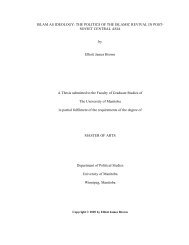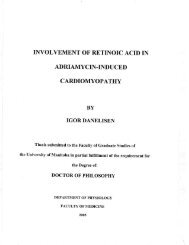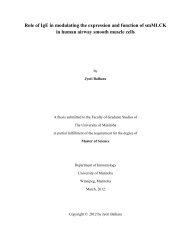Influence of Maternal Prenatal Vitamin D Status on Infant Oral Health
Influence of Maternal Prenatal Vitamin D Status on Infant Oral Health
Influence of Maternal Prenatal Vitamin D Status on Infant Oral Health
You also want an ePaper? Increase the reach of your titles
YUMPU automatically turns print PDFs into web optimized ePapers that Google loves.
<str<strong>on</strong>g>Maternal</str<strong>on</strong>g> Awareness <str<strong>on</strong>g>of</str<strong>on</strong>g> Early Childhood Caries<br />
When asked, 77.2% <str<strong>on</strong>g>of</str<strong>on</strong>g> women indicated that they had heard <str<strong>on</strong>g>of</str<strong>on</strong>g> Early Childhood Caries<br />
(ECC) or its antecedent terms “baby-bottle tooth decay”, “nursing caries”, or “tooth rot”.<br />
Forty-eight women (23.5%) thought that ECC was a normal part <str<strong>on</strong>g>of</str<strong>on</strong>g> childhood while<br />
another 36 participants (17.7%) were uncertain. Am<strong>on</strong>g those with children, 32.9% (23)<br />
indicated that some <str<strong>on</strong>g>of</str<strong>on</strong>g> their children had experienced ECC, while 65.9% (135) <str<strong>on</strong>g>of</str<strong>on</strong>g> the<br />
entire maternal cohort knew children who had suffered from ECC. Further, 23.9% <str<strong>on</strong>g>of</str<strong>on</strong>g><br />
women with children (17/71) indicated a child <str<strong>on</strong>g>of</str<strong>on</strong>g> theirs required dental surgery under<br />
general anesthesia. Surprisingly, 88.4% thought ECC could be prevented.<br />
When women were asked when children should see the dentist for the first time<br />
<strong>on</strong>ly 6.8% resp<strong>on</strong>ded by the erupti<strong>on</strong> <str<strong>on</strong>g>of</str<strong>on</strong>g> the first primary tooth, which coincides with<br />
current pr<str<strong>on</strong>g>of</str<strong>on</strong>g>essi<strong>on</strong>al recommendati<strong>on</strong>s. However, 48.3% indicated that this should occur<br />
while the child was <strong>on</strong>e year <str<strong>on</strong>g>of</str<strong>on</strong>g> age (12-23 m<strong>on</strong>ths).<br />
<str<strong>on</strong>g>Maternal</str<strong>on</strong>g> <strong>Oral</strong> <strong>Health</strong><br />
Enrolled participants were asked a select group <str<strong>on</strong>g>of</str<strong>on</strong>g> questi<strong>on</strong>s relating to maternal oral<br />
health since dental examinati<strong>on</strong>s <str<strong>on</strong>g>of</str<strong>on</strong>g> mothers were not part <str<strong>on</strong>g>of</str<strong>on</strong>g> the planned research<br />
protocol. Most women (90.3%) reported that they believed their dental health was<br />
important during pregnancy. Unfortunately, <strong>on</strong>ly 38.5% rated their own current dental<br />
health to be good. The majority <str<strong>on</strong>g>of</str<strong>on</strong>g> participants indicated that they had been to the dentist<br />
within the last year (71.4%), while another 14.1% indicated that their last dental<br />
appointment was in the past two years. Am<strong>on</strong>g those who had never been to the dentist or<br />
who had not been seen in the last two years, 21.4% indicated that it was due to a lack <str<strong>on</strong>g>of</str<strong>on</strong>g><br />
3-6







![an unusual bacterial isolate from in partial fulf]lment for the ... - MSpace](https://img.yumpu.com/21942008/1/190x245/an-unusual-bacterial-isolate-from-in-partial-fulflment-for-the-mspace.jpg?quality=85)





![in partial fulfil]ment of the - MSpace - University of Manitoba](https://img.yumpu.com/21941988/1/190x245/in-partial-fulfilment-of-the-mspace-university-of-manitoba.jpg?quality=85)


